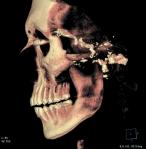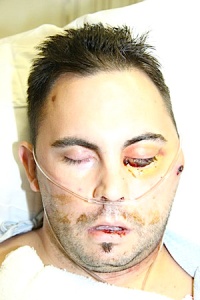Survivors SPEAK OUT! Jim Ledgewood
presented
by
Donna O’Donnell Figurski

1. What is your name? (last name optional)
Jim Ledgewood
2. Where do you live? (city and/or state and/or country) Email (optional)
Phoenix, Arizona, USA
3. On what date did you have your brain injury? At what age?
January 27, 2006 Age 27
4. How did your brain injury occur?
I was shot with a 9 mm on the left side of my face.
5. When did you (or someone) first realize you had a problem?
I did not realize I had a brain injury until seven years after being shot. My company brought to my attention that something was off.
6. What kind of emergency treatment, if any, did you have?
I had multiple surgeries. They had to put twenty-five coils around my carotid artery to stop the bleeding around my brain.
7. Were you in a coma? If so, how long?
I believe they induced a coma in me. Not sure, though.
8. Did you do rehab? What kind of rehab (i.e., inpatient or outpatient and occupational and/or physical and/or speech and/or other)? How long were you in rehab?
I had inpatient rehab (cognitive, physical, and speech therapies) at St. Joseph’s Hospital/Barrow Neurological Institute and at Mesa General Hospital; outpatient rehab (cognitive, physical, occupational, and speech therapies), for one week at Mesa General and for one week at Chandler Regional Medical Center.
 9. What problems or disabilities, if any, resulted from your brain injury
(e.g., balance, perception, personality, etc.)?
9. What problems or disabilities, if any, resulted from your brain injury
(e.g., balance, perception, personality, etc.)?
The frontal and temporal lobes were damaged, so all the things that those two parts of the brain control were affected in a negative way.
Donna’s note: The cerebral cortex can be divided into four sections, which are known as lobes: frontal, parietal, occipital, and temporal.
Following a frontal lobe injury, an individual’s abilities to make good choices and recognize consequences are often impaired. Damage can cause increased irritability, which may include a change in mood and an inability to regulate behavior, such as anticipation, goal selection, planning, initiation, sequencing, detecting errors, and initiating novel responses.
The temporal lobe is located behind the ears and extends to both sides of the brain. It is involved in hearing and holds the primary auditory cortex, which receives sensory information from the ears. Secondary areas process the information into speech and words. Left temporal damage can disturb recognition of words and impair memory for verbal material.
10. How has your life changed? Is it better? Is it worse?
There are certain things that I was able to do before my TBI (traumatic brain injury) that I cannot do now. This has affected all aspects of my life.
11. What do you miss the most from your pre-brain-injury life?
I miss the control I had over my life.![]()
12. What do you enjoy most in your post-brain-injury life?
I like helping others and being able to share my story. I take pleasure in doing something that only 5% of 5% of the population is able to do.
13. What do you like least about your brain injury?
Everything
14. Has anything helped you to accept your brain injury?
Learning and understanding my TBI and what it is doing have helped.
15. Has your injury affected your home life and relationships and, if so, how?
I have to move at a different pace than others. A lot of people around me have a hard time because they don’t know or understand why I do what I do or why I express myself the way I do. Once people learn that I have a TBI, the part of my brain that was injured, and what that part of the brain controls, they get more comfortable. But, I believe they are still not 100% comfortable.
16. Has your social life been altered or changed and, if so, how?
I was not in a relationship before my injury. I have found it hard to get into a relationship since my injury.
17. Who is your main caregiver? Do you understand what it takes to be a caregiver?
I am my own caregiver.
18. What are your plans? What do you expect/hope to be doing ten years from now?
I hope to have that relationship/family that I thought I would have by now. I don’t try to look that far into the future.
19. Are you able to provide a helpful hint that may have taken you a long time to learn, but which you wished you had known earlier? If so, please state what it is to potentially help other survivors with your specific kind of brain injury.
 I would say that you should learn as much as you can about your TBI. That way you know that problem. Then you can try to come up with solutions to better your life.
I would say that you should learn as much as you can about your TBI. That way you know that problem. Then you can try to come up with solutions to better your life.
20. What advice would you offer to other brain-injury survivors? Do you have any other comments that you would like to add?
It is not what happens – it is what you do about it that defines the person you are.
N-E-V-E-R G-I-V-E U-P!
Please leave a comment/question. I will respond.
(Clip Art compliments of Bing.)
As I say after each post: Please leave a comment by clicking the blue words “Leave a Comment” below this post.
below this post.
Feel free to follow my blog. Click on “Follow” on the upper right sidebar.
If you like my blog, share it (intact) with your friends. It’s easy! Click the “Share” buttons below.
If you don’t like my blog, “Share” it (intact) with your enemies. I don’t care!
Feel free to “Like” my post.


Comments on: "Survivors SPEAK OUT! Jim Ledgewood" (3)
Thanks for sharing your story. Also, thank You for the side notes explaining the different lines and how they are affected. I see myself in the frontal lobe area/issues. As part of my my injury was frontal lobe (bruising). Yes, it’s so hard to understand if you don’t feel it and live it. Best of luck to him!
LikeLike
Lobes* not lines
LikeLike
Thank you for sharing. It is hard accepting the injuries that come from a tbi arms the deficiencies that come with it. I have frontal and temporal lobe issues. Each day is different. Acceptance is hard, which makes survivors tough as nails, remember that- we are tough as nails. God kept us here for a reason. To tell our stories. Keep your chin up. Hugs.
LikeLike